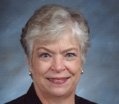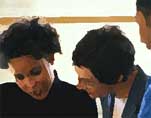Interview with Susan EddinsPresidential Award for Secondary Math Teaching, 1989 |
 |
Recently retired, Susan Eddins taught high school mathematics, particularly with gifted students, for over 30 years. Throughout her career, she has published a variety of articles and books and continues to be involved in the writing of state and national mathematics standards. Susan has also served as president of the Council of Presidential Awardees in Mathematics.
How did you get started in writing for publication?
I started out as a co-author on the first edition of the University of Chicago Algebra book. The University of Chicago took a risk because a number of us on that writing team had not been major authors for any publication before. What we had was experience in teaching and the subject matter. Good co-authors and editors helped guide that process and refine our writing so that it was effective in terms of communication.
Since then I have written for NCTM’s Mathematics Teacher, Student Math Notes, and written a chapter in a book, Windows of Opportunity, that addresses the mathematical learning in special needs students. I also was a member of the writing team for Principles and Standards for School Mathematics for NCTM. Writing is not something that is difficult for me, but what I found works the best is when I write about things that I know. Currently I do a lot of writing at the state level, reviewing standards and assessments.
How did you juggle your teaching responsibilities with writing?
I write in spurts and I kind of get on a tear. I think about the topic and I may write some notes, not exactly an outline, but sort of a flow. And within that flow, I’ll write some phrases. And then I leave it for a bit. Then I come back and write for as long as I’m on a roll. That works for me. Each person finds whether he or she can do it in a disciplined manner or the way I do it, which is a little bit random. There are times when I need to write and I just am not getting inspired. I will usually just make myself start writing. What I write at the beginning of that session is not very good, but if you kind of force yourself to get into it, it generally improves as you keep going.
What advice would you give to a teacher who wants to start writing for publication?
First, you have to be willing to try. The worst that's going to happen is somebody is going to send it back and say 'we can’t publish something at this point'. It’s a lot harder to be in front of kids every day and put your ego on the line. Even if you think that your idea is elementary and obvious, there are thousands of people out there who never thought about it. It doesn’t have to be your own original idea as long as you acknowledge the source and talk about what you have done with it—after all, it’s not a dissertation. Those of us who are nearing retirement have seen a lot of things, but there are young teachers out there who haven’t seen them or could be helped to think about them in new ways. You would be surprised by how many folks have never heard of an idea that is “old” to you.
Once you decide to write, start with something you care about, know about, or think is really neat. Something you’ve done, whether it’s an activity in school or a technique you use with students or an ‘ah-ha’ moment that they had. Then try to describe it as clearly and succinctly as you can. Clarity of ideas is really important. Pick one idea and stick to it. Don’t try to write about too many things. Keep it relatively short and to the point. If you’re writing a brief article for Math Teacher or the middle school math journal, write down the essence of it and then see if you can explain it to somebody. Think about what sheets you want to include that might be handouts. That kind of approach makes the task easier to handle. Rather than a narrative, the style could be more like a ‘how to.’ As teachers, we do that a little bit better.
Then have somebody else read it and give you some initial feedback. See if that person can figure out what you're trying to say. It doesn’t matter whether they’re an expert in math or not, because you're really writing for a more general public, math teachers rather than mathematicians. Of course, it is also important to have someone who knows math check the manuscript for accuracy at some point in the process. Try to get somebody who will give you honest feedback. Then your job is to be open to hearing criticisms. I think if you're going to be effective at writing, you have to care about what you write, but you can’t own it to the point where it can’t be altered. So you have to enter a writing process with passion but also with openness. The end product will come out better if you get good feedback than it would have had you just written it in isolation.
State journals are a good place to start. Almost every state or regional organization has a journal that they put out. NCTM publications quite often have a fairly lengthy backlog, so you might want to start someplace else. The advantage of NCTM is that they send articles out to reviewers, so you can get some mentoring or editing help and they’re especially interested in having teachers write.
What advice would you give a teacher looking for a writing mentor?
Having a good mentor or editor who could assess what I had written was very important to me, especially in the beginning when I was new to writing. There are really two different kinds of people that I have read my writing. One kind is someone who will be open to ideas, is enthusiastic, and gets excited about the same kinds of things. They can help you determine whether or not what you're communicating is clear and a worthwhile thing. Then you need somebody else who is really careful about editing and reading. This might be someone in your department who has written or even been a reviewer or editor. That person should be really careful about editing things like the way things were stated and subject/verb agreement as well as the correctness of the mathematics.
What do the various publications want (or not want)?
They’re looking for enthusiasm, good ideas, and things that reflect their philosophy. You have to think about the philosophy of the organization you're going to submit an article to. But mostly, think about what you, as a teacher, want to read since teachers are the audience for these publications. Teachers are also wonderful resources for letters to the editor and responses to educational issues within their own state and their own newspapers. Teachers may also want to write letters to their senators and representatives.
What advice would you give in terms of establishing credibility with publications?
The fact that you have classroom experience, are a Presidential Awardee, and can write relatively well gives you some credibility. So if you can submit something that is of quality, I don’t think they’re going to get turned down because of credibility. You might even add a little paragraph with some credentials.
How do you think your experiences with writing for publication contribute to the advancement of mathematics reform?
In writing for the University of Chicago project, I got really well grounded in what learning mathematics and understanding mathematics was about. The people I worked with were well grounded and forward looking. So when I’ve written, I have written from that grounding. And in the early 90s, I got involved with standards and a lot of what I’ve written has affected the standards movement. I’ve been a part of defining where state standards are and the influence they have had on mathematics teaching and learning, for better or for worse.
If you have any questions you would like to ask Susan Eddins about her experiences writing for publication, contact her at eddins@imsa.edu

